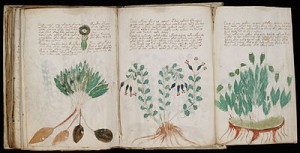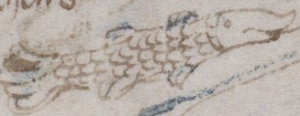 I learned about something interesting today, the Voynich Manuscript, a 15th-century book that has so far gone untranslated (it’s not written in any known language). Some very minor recent progress has been made in a translation as detailed in this link, though it’s really only a vague starting point and we’re nowhere near understanding this book. This has raised the question of whether this book is all some elaborate hoax? While it’s certainly possible, a hoax of this magnitude (~240 pages!) is not considered very likely (carbon dating does give us the age of the vellum the manuscript is written on). The manuscript appears to be divided into six sections: human biology, herbs, astronomy, cosmology, recipes, and medicine.
I learned about something interesting today, the Voynich Manuscript, a 15th-century book that has so far gone untranslated (it’s not written in any known language). Some very minor recent progress has been made in a translation as detailed in this link, though it’s really only a vague starting point and we’re nowhere near understanding this book. This has raised the question of whether this book is all some elaborate hoax? While it’s certainly possible, a hoax of this magnitude (~240 pages!) is not considered very likely (carbon dating does give us the age of the vellum the manuscript is written on). The manuscript appears to be divided into six sections: human biology, herbs, astronomy, cosmology, recipes, and medicine.
You can viewed high resolution scans of all pages on Yale’s website. Browsing through the manuscript, I came across one image that seemed quite odd, from page 70r:

Does that look familiar to anyone else? It sure reminds me of a Coelacanth, a fish presumed extinct, known only by its fossil record until one was caught off South Africa in 1938:

It’s possible that these fish were known of in the fifteenth century and then forgotten, but these days it’s only found in the Indian Ocean and Indonesia…perhaps providing a clue into the author’s travels?
The Voynich manuscript is a neat mystery…and while I am excited about the prospect of it being someday translated, it’s almost better off in mystery form. You can read more about it over at Wikipedia.
